Amet minim mollit non deserunt ullamco est sit aliqua dolor do amet sint. Velit officia
Amet minim mollit non
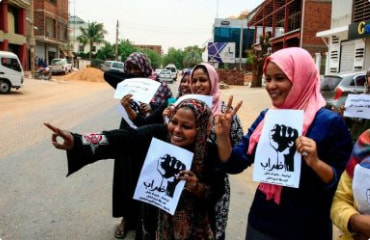

Amet minim mollit non deserunt ullamco est sit aliqua dolor do amet sint. Velit officia

Amet minim mollit non deserunt ullamco est sit aliqua dolor do amet sint. Velit officia

Welcome to WordPress. This is your first post. Edit or delete it, then start writing!
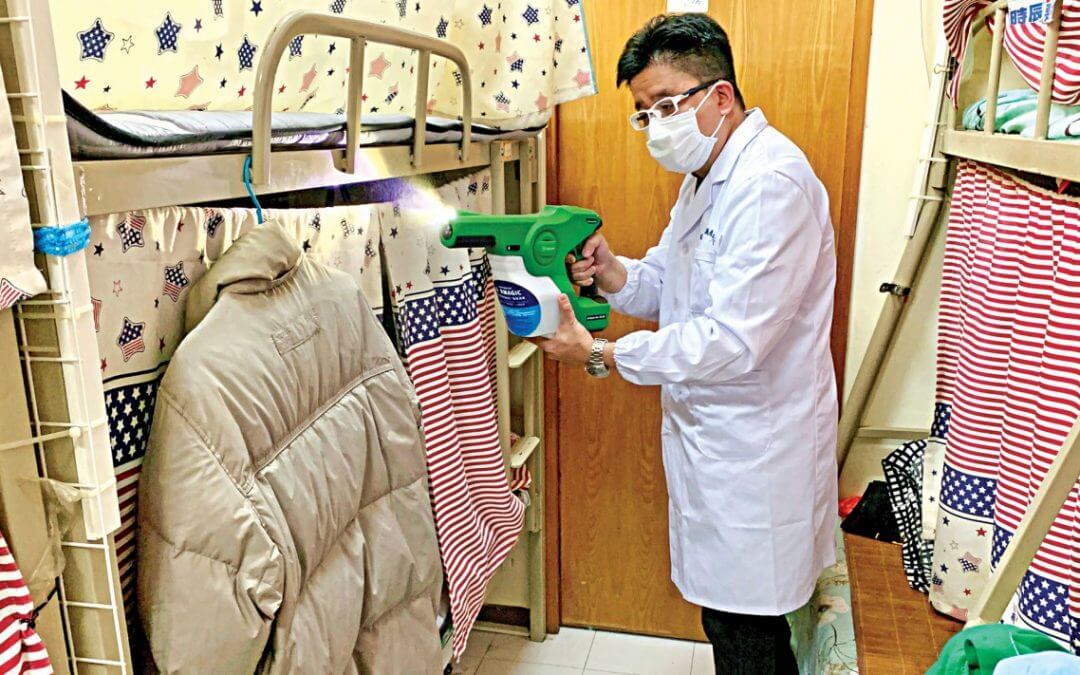
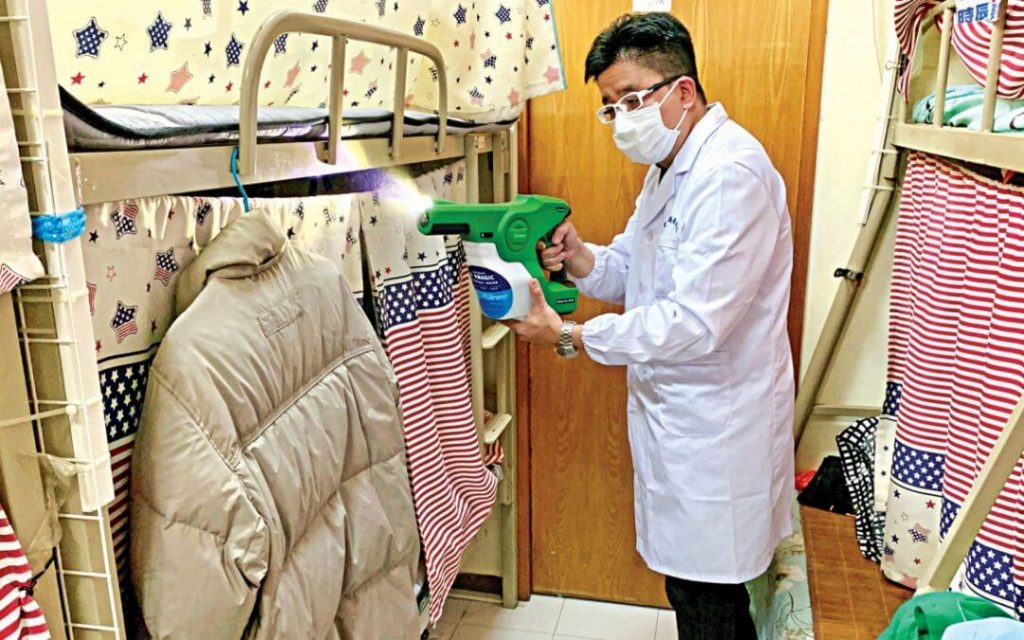
More information about remdesivir, a possible COVID-19 treatment that we have covered in the past, has surfaced this past week. The drug will most likely “become the ‘standard of care’ for all infected patients,” but it will not prevent death nor will it be “widely accessible to the public.” Despite these downfalls, the research has provided health care professionals with hope “that a drug can indeed have an impact on COVID-19.”

Researchers believe that they have “developed an antiviral coating which could provide 90 days of ‘significant’ protection against bacteria and viruses such as the one causing COVID-19.” The coating has been tested and developed over the past ten years and will be available in stores across Honk Kong next month.

Land Dispute: The head of Sudan’s Sovereign Council acknowledged for the first time that Ethiopian forces are in control of Sudanese territory on the border between the two countries. The agricultural lands that separate Sudan from Ethiopia have been disputed for many years, and Sudanese troops were deployed to defend it earlier this year.
Human Rights: The Sudanese government has decided to criminalize female genital mutilation, a medical practice that has affected 65% of all Sudanese women in 2018. In the past, Sudan has been considered “one of the worst countries for women’s rights.” The Sudanese Ministry of Foreign Affairs has asked that all community groups and civil society organizations add to the effort to put an end to female genital mutilation after a “special article” is “added to the country’s criminal law.”

As rumors of leader Kim Jong-Un’s health have disseminated throughout the world, South Korea released a statement saying that he is “alive and well.” The rumors began to appear after Kim Jong-Un did not attend a celebration for his great-grandfather’s birthday on April 15th; it was said that “he may have died” or that he was “in a vegetative state following cardiovascular surgery earlier this month.”

Both western and southern Syria were targeted by “alleged” Israeli airstrikes on Thursday night and Friday. Syrian media outlets have stated that “the targets belonged to Hezbollah.” Several civilians were injured near a military site; ten people are currently being treated in hospitals.
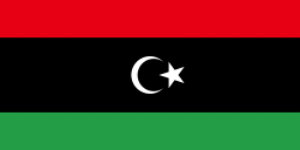
Power Shift: Khalifa Haftar, the eastern-based military leader, has stated that “his Libyan National Army (LNA) was accepting a ‘popular mandate’ to rule the country.” He has yet to specify what exact changes will come with this shift of power, but his statement directly brushed “aside the civilian authorities that nominally govern eastern Libya.”
Ceasefire: On Thursday, Khalifa Haftar announced that “his forces will cease hostilities during… Ramadan.” However, shortly after the announcement was made, the sounds of explosions erupted from Tripoli. An unnamed source from the United Nations-recognized Government of National Accord (GNA) does not believe that Haftar’s troops will “adhere to the truce.”
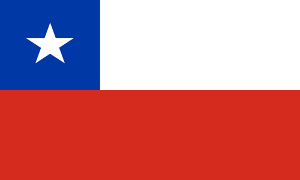
Despite the fact that that World Health Organization (WHO) has claimed that “there is ‘no evidence’ that people who contract coronavirus are immune from being infected again,” the Chilean government has decided to distribute certificates to those who have recovered from COVID-19. Chilean Deputy Health Minister Paula Daza stated that “the documents would be given to people to allow them to return to work.” However, WHO has argued that these “immunity certificates” could do more harm than good, as recipients are most likely going to ignore public health guidelines.

Over 700 Iranians have died after using methanol to cure the coronavirus. There were only 66 deaths from alcohol poisoning last year, but from February 20th to April 7th in 2020, more than 720 Iranians have fallen victim to alcohol poisoning. Those who have ingested methanol but have not died have lost eyesight and are experiencing severe eye damage.
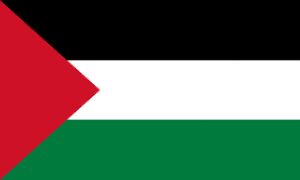
On Thursday, chief prosecutor of the International Criminal Court (ICC), Fatou Bensouda, “reiterated her position that Palestine is a state for the purposes of transferring criminal jurisdiction over its territory to The Hague.” Her statement further clarified that the ICC has jurisdiction to investigate ongoing war crimes in the West Bank, the Gaza Strip, and East Jerusalem. Israel has denounced this decision, claiming that Bensouda has disregarded “the opinions of many of the world’s leading experts on international law points” so she can “harm the state of Israel and tarnish its name.”

Several states have decided to slowly open businesses, but recent data from the Institute for Health Metrics and Evaluation (IHME) shows that the coronavirus could cause more than 70,000 deaths, which is “an increase of over 6,000 deaths from its latest forecast.” COVID-19 could claim more than 74,000 lives in the first wave alone, and this new data estimates that the highest projection is now greater than 130,000 deaths.

Nicaragua is one of a few countries that has continued to allow sporting events to take place. This past Saturday, 16 boxers competed in matches because they “have to eat, they can’t stay shut up in their house,” according to Rosendo Álvarez, a former world champion. Nicaragua has only reported 11 cases of the virus and three deaths. Before competing, the boxers underwent checkups but were not tested for COVID-19.

As the government slowly eases lockdown measures, multiple protests have taken place throughout the country. On Saturday, protesters “lobbed an explosive device at a bank.” On Monday, demonstrators blocked a major highway north of Beirut with burning tires after they were “forcibly removed” by Lebanese troops. The army has stated that “it respects the people’s right to protest as long as the protesters don’t close roads or attack public and private property.”
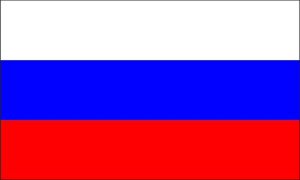
Nurses in Moscow have “quit en masse” because of the “poor working conditions and low wages.” Health care professionals in Moscow have limited access to “clean protective gear [and] food and adequate accommodations.” Russia has over 87,000 confirmed covid cases and half of those are in Moscow.

On Monday, officials announced that there are no more hospitalized COVID-19 patients in Wuhan. More than 80% of coronavirus deaths in China occurred in Wuhan.

Zimbabwe’s opposition forces are facing new challenges after last month’s Supreme Court ruling that Nelson Chamisa’s leadership over the Movement for Democratic Change was illegitimate. COVID-19 restrictions have prevented the party from having any large gatherings. However, Chamisa has remained silent since the decision, leaving the party in disarray over who their leader should be.

Despite the fact that Myanmar is currently under investigation by the International Court of Justice for the Rohingya Muslim Genocide, the military has continued to openly discriminate against minorities, and it has been accused of “carrying out ‘war crimes’” against said groups. The government has been abusing power since COVID-19 surged throughout the country and is once again committing “crimes against humanity,” according to the United Nations’ reporter on human rights in Myanmar.
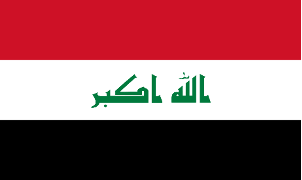
Iraq’s medical infrastructure is heavily unprepared for the coronavirus; there are “only 0.8 doctors and 1.4 beds per thousand people.” The country has also been ruled by a transition government since December and has yet to form a new, more stable government structure.

As the food shortages worsen during the COVID-19 outbreak, the government has “set new price controls for more than two dozen products.” Civil unrest has led to protests and riots throughout the nation, especially in the countryside. So far, more than 500 protests have taken place in the past month; some have resulted in “looting and violence.”
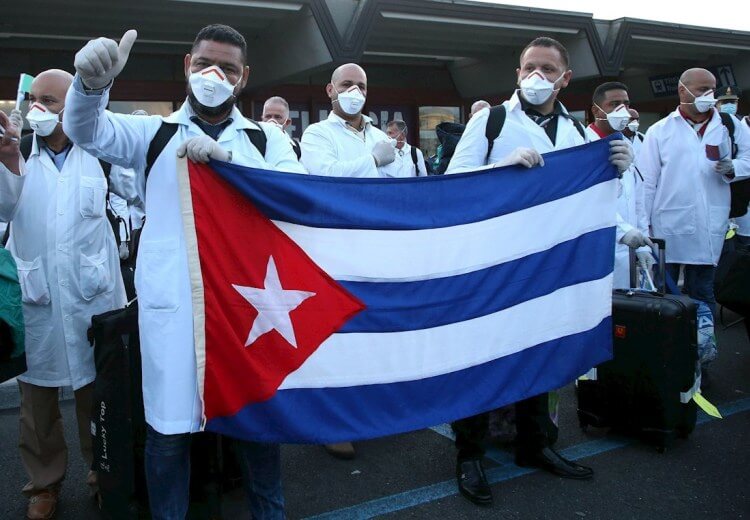

The Numbers: The number of confirmed cases of COVID-19 has surpassed one million. The United States currently has the most cases in the world with a total of 265,506.
A Global Effort: Companies around the world are coming together to produce ventilators, hand sanitizer, and masks for health care professionals. Doctors are also traveling to different countries to help battle COVID-19; more than 29,000 Cuban doctors are currently working in 59 countries.
Cancellations: Countless tournaments and major sporting events have been canceled and postponed as an effect of the coronavirus. Wimbledon and the Olympics have been postponed for the first time since World War II.

Coronavirus: The government has implemented a three-week-long nationwide lockdown, causing people to flock to grocery stores. Zimbabwe is still experiencing the effects of a drought that occurred two years ago; there is a shortage of “maize meal, or mealie meal, a Zimbabwean staple.” Citizens are more worried about dying of hunger than the coronavirus. The ongoing economic crisis also poses a problem for the government; “Zimbabwe’s annual inflation soared to more than 500 percent in February.”
Economic Crisis: According to Zimbabwe’s Energy Minister, the nation “has paid the $33 million debt it owed to South Africa’s Eskom Holdings SOC Ltd.” Zimbabwe is now creating its plan to pay the debt it owes Mozambique.

Protests: Despite the lockdown, Lebanese citizens of Tripoli broke the curfew to protest against the lack of governmental compensation for businesses that have closed due to the coronavirus. Protesters are also demanding financial aid to cover rent and utility payments.
Human Rights: Sans-papiers in Lebanon have been denied the possibility to be tested for Coronavirus due to the high costs of the procedure. Some hospitals have confirmed that their policy is to turn away undocumented people, claiming that they are not in need of health care.

Riots: Several riots have occurred among prisoners in Iran over fears of contamination in prisons. Iran’s prison authority recently released over 100,000 prisoners to slow the spread of COVID-19 amongst inmates. Furlough excludes so-called “security cases,” including violent offenders, dual-nationals, and people with ties to western governments.
Sanctions: Iranian officials are pressing the United States to lift sanctions in order to properly treat coronavirus patients. Foreign Minister Javad Zarif referred to the sanctions as “economic terrorism,” as they are preventing Iran from purchasing necessary medical equipment. The country has more than 47,000 confirmed cases and more than 3,000 deaths.

The government has banned public gatherings of more than four people. Citizens are afraid that this will “be used to crack down on political dissent – and it appears to be happening already.” Protesters gathered on Tuesday to mark seven months since police randomly beat passengers on a train. The police quickly detained the protesters “to avoid the spread of the disease in society.”

Wuhan residents are suspecting that the Chinese government hasn’t been completely truthful about the number of virus-related deaths the country has seen in the past few months. As the two-month lockdown is coming to an end, citizens have noticed that crematoriums have been working nonstop. Radio Free Asia has estimated that 42,000 urns will be given out in a 12 day period, and “there have also been claims of city officials paying off families in exchange for their silence.”

United States Secretary of State Mike Pompeo presented the “Democratic Transition Framework for Venezuela” on Tuesday. According to Pompeo, the plan “ends the suffering and opens a path to a brighter future for Venezuela.” It would replace both Maduro and Guaidó with a five-person council until the next presidential and parliamentary elections, which are set to take place in six months to one year. The framework would also require the US to lift sanctions so that Venezuela could strengthen its economy.

COVID-19: Tripoli has announced the liberation of 450 prisoners as a measure to limit the spread of the virus in prisons. The preventative measure was announced after Hanan Salah, Human Rights Watch’s senior researcher, reported that the Libyan Health Care system is not strong enough to cope with a large number of patients.
Missile Attack: On Wednesday, a Turkish warship fired missiles in Al-Ajaylat, “which is under the control of Field Marchal Khalifa Haftar.” Libyan news sources have said that the missiles could have initially been targeted at the Al-Watiya Air Force Base. There were no casualties.

Bolivians are getting increasingly frustrated with the government’s response to the coronavirus after completing two weeks in quarantine. Most Bolivians have lost their main source of income; they have yet to receive government assistance. Residents of Cochabamba even took to the streets to express their dissatisfaction.

As the coronavirus continues to wreak havoc around the world, Myanmar has “temporarily” suspended entry visas. It has also stopped all international flights from landing in the country. The government confirmed its first two cases of the virus just last week and the first death on Tuesday. More preventative measures are expected to be implemented in the near future.

The UN “has showered praise on Israel for is ‘excellent’ cooperation with the Palestinian Authority in fighting the coronavirus.” The two nations have implemented a mechanism that allows them to communicate “moment by moment” on all virus-related issues. However, the Palestinian delegation still slammed Israeli leaders, saying “occupation knows nothing of humanity.”

Prime Minister Abdil Abdul-Mahdi held a cabinet meeting on Sunday where he “warned that carrying out attacks and acts of war without the authorization of the Iraqi government is a clear violation of Iraq’s sovereignty.” Given that the coronavirus is a major threat to countries around the world, Abdul-Mahdi is adamant that violence within the country must decrease in order to more directly focus on treating patients.

While much of Latin America is closing its borders to prevent the spread of COVID-19, Nicaraguan officials are still considering the pandemic “overrated.” They are encouraging citizens to go about their everyday lives, and the government has yet to place a limit on large gatherings. Residents are begging the government to do more. In response to their pleas, President Ortega replaced his health minister on Wednesday.

According to South Korean officials, North Korea launched what was believed to be two short-range ballistic missiles into the Sea of Japan on Sunday. South Korea’s Joint Chief of Staff has deemed the test to be “totally inappropriate behavior,” given that the world is grappling with a pandemic.

After US President Donald Trump and Vladimir Putin spoke this week, a Russian military plane carrying medical supplies landed in the US on Wednesday. The supplies included “60 tons of ventilators, masks, respirators, and other items.” However, an argument over the nature of the shipment quickly revived tensions between Trump and Putin. Trump called it “a very nice offer,” when in reality they were purchased from Russia at below-market prices.

US soldiers are pulling out of the third base this month in Iraq, leaving at least $1.1 million of equipment to Iraqi forces. More withdrawals are expected to take place in the near future. The current mission of the US army is to occupy only two bases in Iraq.

Ceasefire: Turkish armed forces hacked into a Syrian army radio broadcast to issue “a warning not to violate the de-escalation zone.” Turkey has continued to mobilize forces in Idlib “in case the agreement breaks down.”
Coronavirus: Syria’s Ministry of Health has reported its first virus-related death.
Hungary: Citing the urgency of the coronavirus pandemic, Hungary’s parliament has approved a bill to allow Prime Minister Viktor Orban to rule by decree with no end date. After this approval, Ursula von der Leyen warned that coronavirus emergency measures taken by countries in the EU must be “limited,” as the bill is explicitly circumventing democratic institutions in the EU.
Mexico: Maria Elena Ferral, a correspondent for the Diario del Xalapa daily newspaper, was shot and killed on Monday. Mexico is one of the most dangerous places in the world for a reporter to work; more than 100 journalists have been murdered since 2000.
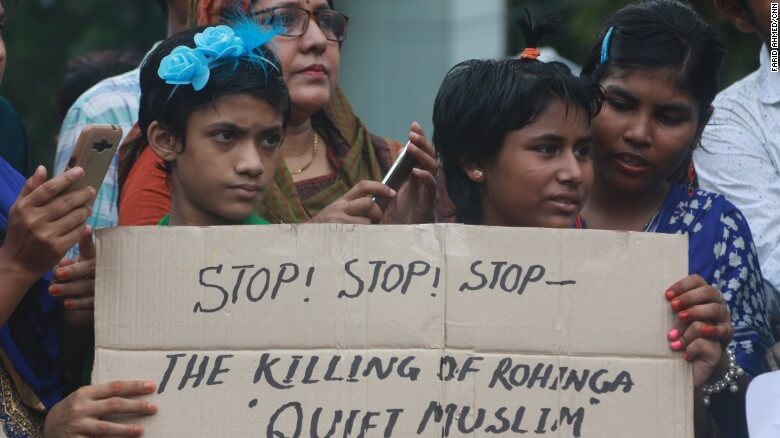

Weekly Report 24 January 2020

In a unanimous decision, the International Court of Justice has ordered Myanmar to “prevent all genocidal acts against Rohingya Muslims.” Following years of international scrutiny and protests against Myanmar’s treatment of its Muslim population, the ICJ finally stepped in. The government is now responsible for following Act Two of the Genocide Convention, preventing the military from carrying out genocide, reporting back to the ICJ in four months, and continuing to report to the ICJ every six months.
The Office of the President has released a summary confirming that war crimes have indeed been committed along with “serious human rights violations.” However, the government still denies any genocidal intent or crimes against humanity. The Office of the President has not fully addressed the full scale of the crimes committed against the Rohingya, dismissing claims of sexual violence and rape.

Students at Njube High School in Bulawayo staged a protest Monday over deteriorating education conditions. Nearly 200 students marched through the streets with the rallying cry “education is ours.” Zimbabwe’s quality of education has been declining in light of their economic crisis, with teacher pay being so low that they have resorted to going on strike. The main teacher who helped stage the protest has been forced to flee the country after learning he was wanted by state security agents.
Additionally, opposition leader Nelson Chamisa called on supporters to ready themselves for more protests in a rally this week. The worsening economic crisis has only been exacerbated further by the worst drought the country has seen in 40 years. “The constitution allows (us) to demonstrate when we feel it’s necessary. So this is going to be a year of demonstrations and action,” Chamisa said.
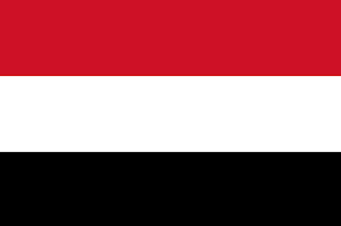
Yemen experienced the bloodiest attack since the start of its conflict five years ago this past Saturday. Ballistic missiles struck a mosque at the al-Estiqbal military camp in Ma’rib where soldiers were assembled for evening prayers. The death toll is currently at 116 and expected to rise. The government announced the Houthi rebel movement is to blame, but no group has claimed responsibility for the attack yet. Fighting between rebel and government groups has escalated in the days following the attack, which is sure to complicate the country’s steps towards peace.
The civil war, which has been raging on since 2014, has become one of the regions deadliest conflicts. The United Nations special envoy to Yemen condemned the attacks, saying that “such actions can derail this progress [towards de-escalation]. The negotiation tables are more effective than battlefields in resolving the conflict.”

Abdolhossein Mojaddami, a local paramilitary security force commander, was gunned down by two masked men on Wednesday. Mojaddami was an associate of the recently assassinated Soleimani. The motive behind the killing remains unclear.
In the growing aftermath of the United States’ targeted killing of Iranian General Qasem Soleimani, tensions between the two countries are at an all-time high. Following Iran’s confirmation that it shot down the Ukranian commercial airliner by mistake, the country’s administration is experiencing a wave of protests. These protests mark the most serious challenge that the Supreme Leader has faced in decades.
In response to the protests, Supreme Leader Ayatollah Ali Khamenei defended the military in a rare public appearance. Leading Friday prayers, he called for national unity while criticizing the US government and its involvement in the region.

What began as peaceful protests in Beirut months ago have escalated into violence in recent days. More than 540 protesters have been injured in these clashes with police. The protesters’ original complaints against tax hikes have turned into calls for revolution against the ruling class.
In response, Lebanon’s leaders formed a new government on Wednesday with Hassan Diab as their new Prime Minister. He stated that the new government “represents the aspirations of the demonstrators who have been mobilized nationwide for more than three months.” This is the first established government Lebanon has seen since the resignation of the last Prime Minister in October.
Despite Diab’s promising remarks, protesters have yet to be satisfied. A reporter for Al Jazeera has stated that the people “have lost faith in the ruling authorities. They believe they should give up power.” Citizens are skeptical of the new government and are desperate for change and a solution to their economic plight.

Hundreds of thousands of protesters took to the streets of Baghdad on Friday, calling for US troops to end their occupation of the country. Iraq has seen renewed protests and clashes with police forces ever since the US-backed airstrike killed General Qassem Soleimani in neighboring Iran. While the government has stated that they do not want to be caught in the middle of this feud, the death toll of these protests has spiked.
Many Iraqis see the US occupation as a breach of their own sovereignty, as there are still roughly 5,000 US troops stationed in Iraq. Their parliament voted recently to expel the troops from their country, but US military leaders have not agreed to these demands.

Hong Kong’s protesters are showing no signs of slowing down in the new year; thousands have taken to the streets to continue demanding for democracy.
A number of foreign dignitaries and diplomats have sent an open letter to Chief Executive Carrie Lam, calling for her to address the problem and respond to the six months of protests. That same day, China’s President Xi Jinping stated that Beijing would “resolutely safeguard the prosperity and stability” of Hong Kong.
Days later, China fired Wang Zhimin, the country’s top liaison in charge of relations between China and Hong Kong.

Two provincial military officers have been connected to an incident involving the torturing of a villager who was in their custody. Colonel Sar Bunsoeung and First Lieutenant Chhoy Rathana have stated that they “neglected to protect five villagers involved in a land dispute.” The Cambodian Human Rights Committee has released statements concerning the case, saying that it “will be a warning to powerful government officials and authorities not to violate the law.”
One of the civilians in custody passed away during his time with the two military officers. Following the civilian’s death, Prime Minister Hun Sen created a special committee to look further into the case. Should the officers be found guilty, they could serve two to five years in prison.

Sudan had entered into a new period of political instability following recent clashes between loyalists and military forces. On January 14th, a shooting took place in Khartoum, causing the airport to close. The rebellion was led by ex-elite troops who had pledged their loyalty to Bashir. Two soldiers were killed and four were injured. This is the most extreme case of unrest since Bashir was overthrown in April of 2019. The airport has since reopened.
Ever since Sudanese leader Omar al-Bashir was placed into a social reform facility this past December for corruption, protesters have taken to the streets in hopes of creating a new form of government. School girls are singing songs of protests and staging gatherings of their own. These types of protests would not have been allowed under Bashir, as they would have been met with “tear gas and batons, perhaps worse.” In this new era, protesters no longer fear the police, a feat that was once impossible under Bashir’s rule.
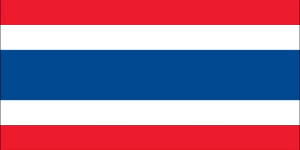
The Future Forward Party, still in its nascent stages, avoided disbandment on January 21st, despite having more than 25 legal cases being presented against it. The FFP and its leaders have been found not guilty of attempting to overthrow the current regime.
Despite being less than a year old, the FFP amassed 17% of the votes in the 2019 elections. A recent December poll shows that the party’s leader, Thanathorn Juangroongruangkit, is more popular than the current Prime Minister, with Thanathorn receiving 31% of votes and the incumbent receiving 24% of the votes. The FFP wants to lessen the military’s role in government in hopes of creating a more democratic Thailand.

The political crisis in Venezuela is still at a stalemate as Nicolás Madura and Juan Guaidó continue to argue over who is the legitimate president. Madura, who has been in power for two decades, was re-elected in 2018, but many civilians believe the election to be rigged in his favor. A year after Juan Guaidó, chairman of Venezuela’s opposition-controlled national assembly, declared himself president, he is no closer to removing Madura from office.
Guaidó has received aid and support from much of the international community. US Secretary of State Mike Pompeo met with Guaidó in Colombia to pledge the US’s continued support to the man who they see as the legitimate leader of the country. This violates a travel ban put in place by the country’s pro-Madura Supreme Court.

The human rights situation in Vietnam has deteriorated exponentially since 2019. Last year, more than 30 activists were imprisoned for exercising their freedom of expression, association, and religion. Officials continue to place activists and bloggers under house arrest; these activists are also subject to physical assault. Activists are not allowed to leave the country, infringing on their individual liberties.
The EU and Vietnam have been drawing a trade agreement that will supposedly “abolish 99% of customs duties, eliminate bureaucratic hurdles, and ensure easier market access for both European and Vietnamese companies.” The EU-Vietnam Free-Trade Agreement, should it go through, is projected to bring approximately $16.6 billion USD worth of exports into the EU by 2035.
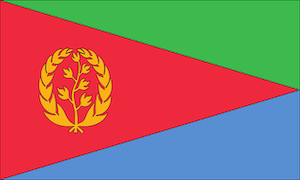
In 2018, Eritrea and Ethiopia agreed to a peace deal, but there has yet to be any visible domestic progress. 12% of the population has fled the “Red Sea nation,” and Eritreans closely trail Syria in the number of refugee applicants seeking asylum in Europe. Many people are seeking asylum due to a national law that forces all Eritrean students, regardless of gender, to complete at least 18 months of military training. People who complete the training have reported many instances of human rights abuses and sexual violence.

The ongoing Syrian Civil War shows no sign of slowing down. On the ground, up to 40 Syrian soldiers have been killed in the north-west region of the country. Idlib is the last stronghold help by anti-Assad forces, and that region has seen an incredible amount of violence in recent weeks. According to a United Nations report, almost 350,000 civilians, 80% of them women and children, have been displaced by the fighting since hostilities escalated at the start of December.

Nicaragua’s two main opposition groups will form a coalition going into their 2021 elections in hopes of defeating President Daniel Ortega. The two groups – the Civic Alliance for Justice and Democracy and Blue and White National Unity – invite any groups and/or individuals that oppose the president to join their coalition, hoping that the recent unrest in the country will spur anti-government momentum.
US Secretary of State Mike Pompeo visited the country this week, where he called upon President Ortega to stop silencing his political opponents in the troubled Central American country. A small group of Nicaraguans demonstrated outside the presidential palace in San José, where Pompeo had talks with Costa Rican President Carlos Alvarado.

Since the resignation of President Evo Morales in November, Bolivian has been plagued with instability, but now it looks like peace might win out. After Morales was found guilty of trying to rig elections, both his supporters and opponents led protests throughout the country. However, Bolivia has been able to edge away from violence because of the work of politicians Jeanin Áñez and Eva Copa. Together, they have rallied their parties together to plan new elections. Ms. Copa has stated that “the priority in those moments was to pacify the country and stop the violence.” In a surprising turn of events, protesters are refraining from taking to the streets, as the real battle will be at the polls.

Kim Jong Un has appointed a new foreign minister, Ri Son Gwon. Gwon is a senior military officer with very little diplomatic experience. He replaces Ri Yong Ho, a diplomat who has many years worth of negotiation experience with Washington. The recent appointment is quite worrisome, as Kim Jong Un is continuing to strengthen the role of the North Korean military on a domestic and global scale, filling his cabinet positions based on party loyalty rather than merit.
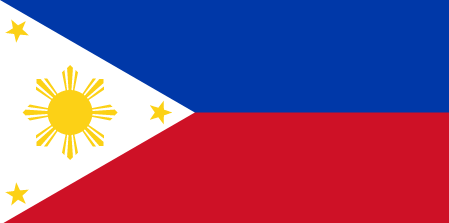
One of the most active volcanoes in the Philippines erupted last week. The United Nations estimated that over half a million people were put at risk, both from the immediate eruption and subsequent earthquakes.
This Friday, the volcano released thick clouds of smoke, confirming scientists’ speculations that more vicious eruptions are going to take place in the near future. The volcanology agency has reported that the next eruption could take place within the next several days or even within the next several hours.

In a dramatic reshuffling of Russia’s leadership, Prime Minister Dmitri Medvedev stepped down from his role just hours after President Vladamir Putin announced changes that would shift power away from the presidency. The constitutional amendments proposed by Putin would help him maintain some political control after he meets his term limit in 2024.
While Putin’s future role in Russia is unknown, he has ruled the country in various roles since 2000, bypassing the 2-term limit of the Presidency by switching in and out of various roles ever eight years. The two offices that his new proposals will give more power to – the State Council and the Prime Minister’s office – are two likely places that Putin might head next. Mikhail Mishustin has been named as the next Prime Minister; he has served as Director of the Federal Tax Service for the past 10 years.

Leaders from the EU, Turkey, and Russia met alongside both parties in the Libyan civil war recently in Berlin. The foreign backers agreed to provide no further military support, honoring the UN arms embargo. The two warring parties, General Khalifa Haftar’s Libyan National Army and UN-backed Government of National Accord, were both in attendance, but refused to meet with each other or agree on the ceasefire themselves. Experts agree that until these parties agree to a ceasefire, the conflict will not dissolve, but this is a small step to limiting the proxy war that has continued since 2011.
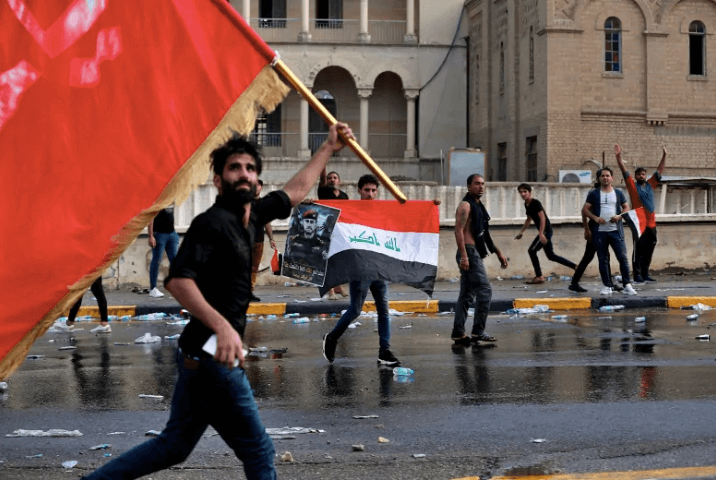

Latin America remains the epicenter of the virus while the United States sees a new spike in cases that has resulted in a return to stricter measures.

The country’s coronavirus count takes a turn as it sets a new daily record of infections on Thursday. The spike in cases has led many states to pause reopening and reimpose restrictions in an attempt to curb infection. The Centers for Disease Control and Prevention now projects thousands more deaths this month.

China has warned of strong countermeasures against the U.S., Australia, and the U.K. should they pursue retaliatory actions against their national security law in Hong Kong. Senior officials have said that the U.K. has no right to grant residency to Hong Kongers, and that it would “bear all consequences” for breaching international law. In the latest standoff between China and India that began with a violent border clash, India has banned 59 apps developed by Chinese firms over concerns that these apps were engaging in activities that threatened India’s national security. Among the apps banned are TikTok, WeChat, QQ, and Xiaomi which count India as one of their biggest overseas markets. Disturbing new evidence from leaked Chinese government documents have also revealed a systematic state campaign to suppress minority births in Xinjiang with potentially genocidal sterilization plans. This campaign’s explicit aim is to reduce 2020 birth and population growth rates in Xinjiang’s southern Uighur regions by “at least” 0.4 percentage points below the 2016 level. Last but not least, researchers in China have discovered a new type of swine flu with purported pandemic potential. Named G4, the virus is genetically descended from the H1N1 strain that caused a pandemic in 2009. The World Health Organization (WHO) has announced that it would study the virus carefully.

Forty days after China announced it would pass a national security law for Hong Kong, that legislation is now in full force. The law was drafted almost entirely in secret in closed-door meetings that even Carrie Lam, Hong Kong’s Chief Executive, was not part of. Promulgated on Tuesday night through China’s National People’s Congress, the law now criminalizes “acts of secession, subversion of state power, terrorist activities, and collusion with foreign or external forces to endanger national security.” The maximum sentence given for each of these four crimes is life imprisonment. The national security law now trumps any existing Hong Kong laws in the case of conflict and grants Beijing broad powers to prosecute Hong Kongers deemed to have committed especially egregious crimes. Just this week, Hong Kong Police have reportedly made more than 300 arrests for illegal assembly and other offences, with nine involving violations of the new law.
In response, the United States and its allies have taken steps to punish China. The U.S. Senate unanimously passed a bill to sanction Chinese officials involved in the national security law’s implementation and the House of Representatives passed legislation to sanction banks that conduct business with these officials. The United Kingdom, meanwhile, has laid down plans to allow 3 million Hong Kongers to seek refuge and apply for citizenship. Australia is considering offering safe haven, and Taiwan has also opened a new office to help fleeing Hong Kong residents.

In a rare move, three Myanmar military officers have been found guilty by a military court-martial for atrocities committed against the Rohingya people in the Rakhine state. Myanmar is currently facing charges of genocide before the United Nations. A recent landslide in a Myanmar jade mine has killed at least 162 people, and many others are still missing. The disaster was reportedly triggered by heavy rain in the area, which set off waves of rock and mud. Myanmar officials appear to be calling out China for arming terrorist groups to allegedly use them as a bargaining chip for smooth implementation of Belt and Road Initiative projects. Many weapons seized by the military from ethnic armed groups have been found to be Chinese-made. The country has also set its general election day for November 8, in a vote widely seen as a test for the country’s fledgling democratic government led by the National League for Democracy.

This week the Zimbabwe government shut down the stock exchange in an attempt to stabilise the local currency as it continues to lose value with hyperinflation at more than 785%. Shop owners and traders are reportedly refusing to accept payment in local banknotes, sparking a police crackdown earlier this week in which 102 people have already been arrested. They are being charged with breaching a section of the Bank Use Promotion Act for their opposition to the use of local currency.

The country is reporting the highest per capita infection rate of the coronavirus of any major country, with 13,000 cases for every 1 million people. Reporters point to widespread social inequity in the country as the main reason for the devastating impact of the pandemic. Additionally, as borders remain closed to curb infection, thousands of foreign workers are left stranded within Chile.

Iraqi officials discovered a new mass grave this week in the North of Iraq – a remnant of the brutal rule of the Islamic State (IS) group. The mass grave, located in the village of Humeydat, stretches several hundred meters with dozens of bodies excavated. Although awaiting investigation, it is believed that the bodies are Shiite convicts taken from the local Badoush prison by IS shortly after IS seized Mosul in June 2014. According to an investigation by the Human Rights Watch, 1,500 inmates were kidnapped and taken to this stretch in the desert. Meanwhile on the 2nd of July, the U.S. Supreme Court declined to hear a plea by almost 1,400 Iraqis who have been convicted of crimes in the U.S. requesting to delay immediate deportation to Iraq where they will likely face persecution and torture. The group hoped to reopen their case before immigration judges and present new evidence.

On Wednesday, U.S. officials encouraged Haftar’s Libyan National Army (LNA) to disband in a virtual meeting. Libya’s conflict is a “rapidly escalating proxy war” between regional powers, contrary to both American and Libyan interests the officials claimed. Today, Russia announced that it will reopen its embassy in the country, though it will be temporarily based in Tunisia. Russian diplomats were last evacuated from Libya in October 2013 after the embassy in Tripoli was attacked.

On Tuesday, the European Union led a virtual conference of over 60 governments and Non-governmental organizations as the UN called for $10 billion worth of aid for Syria. The aid, $3.8 billion for aid inside Syria and $6.04 billion for countries hosting refugees, will be used to support refugees as Syria enters its ninth year of armed conflict and the coronavirus still remains prevalent. International donors have pledged $7.7 billion in humanitarian aid; however, aid group Oxfam said the sum is “simply not enough.” However, in the meantime, there have been reports that numerous tents in war-torn Idlib province are being replaced with new brick houses, with more than 2,000 families now living in brick houses and a limited set of household necessities.

Arab Tawhid Party leader e-minister Wiam Wahhab called on Prime Minister Hassan Diab to resign when he posted a tweet stating “I call on PM Diab to resign before they oust him through street action, because there are negotiations behind the scenes on forming a government and the disagreement is only over some details.” Meanwhile, a number of Lebanese media outlets broadcast interviews with US Ambassador Dorthy Shea, ignoring a judge’s ruling that banned local and foreign media from featuring her statements after she criticized Iran-backed Hezbollah in an interview last week.

As the Israeli self-created deadline of the 1st of July for the finalization of their annexation plans of the West Bank passed, Palestinian offcials state that the mounting pressure of their diplomatic campaign over the past few months forced Israeli Prime Minister Benjamin Netanyahu to “backpedal” on the finalization of the annexation plans. Cabinet minister Ofir Akunis however suggested that the annexation will take place later in July. Meanwhile, protesters in DC linked the Palestinian cause with the Black Lives Matter movement, shouting anti-Israel slogans such as “Israel, we know you, you murder children too.
Palestinian civil society organizations have formed a national campaign that rejects the European Union’s conditional funding that includes an “anti-terror clause.” This clause, included in the EU’s grant proposals late last year, identifies at least seven Palestinian political parties as “terrorist groups” and calls for civil society organizations to conduct background checks on all members ensuring they are not affiliated with any of the seven identifies parties. Civil society organizations have described this clause as “criminalizing the Plaestinian national struggle against the Israeli occupation.”

In a constitutional referendum, Russians have overwhelmingly voted in favor of changes that enable President Vladimir Putin to potentially stay in power up to 2036. The state electoral commission reported that the final vote was 77.9% in favor and 21.2% against with a 65% turnout rate, though critics question the legitimacy of the outcome based on voting irregularities. The New York Times recently broke an explosive story about how a unit of Russia’s military intelligence, Unit 29155 of the GRU, allegedly offered bounties to militants in Afghanistan to kill U.S. troops. A recent nuclear leak detected by the Comprehensive Nuclear Test Ban Treaty Organization (CTBTO) may be related to new nuclear-powered strategic weapons Russia is developing, though Russia denies radiation originated from its nuclear power stations.

North Korean leader Kim Jong Un announced that the country had thoroughly prevented COVID-19 from making inroads at a meeting of the politburo, according to state media. Defections from North Korea have reportedly reached a record low as authorities have exploited the COVID-19 pandemic to strengthen technological surveillance. South Korea recently called for a meeting between U.S. President Donald Trump and North Korean leader Kim Jong Un before the U.S. presidential election in November in order to resume stalled nuclear negotiations. 62 countries also allegedly violated United Nations Security Council sanctions against North Korea from February 2019 to February 2020, according to a report from D.C.-based think tank Institute for Science and International Security. China led the list with more than 60 alleged violations, while Hong Kong followed with 20.

On the 29th of June, Iran issued an Interpol arrest warrant for US president Donald Trump and 35 other government officials for their role in the assassination of Iranian military general Qassem Soleimani on the 3rd of January this year. President Trump has insisted that he was not briefed by intelligence officials over an alleged Russian plot to pay out bounties to Taliban-linked militia in exchange for targeting American and British soldiers in Afghanistan.
Iran has also issued a death sentence for opposition journalist Ruhollah Zam for his active involvement in the widespread Iranian protests in 2017 and 2018. Zam was found guilty by a court in Tehran of “corruption on earth.”

On Thursday, Nicaragua bishops criticise Ortega’s handling of the coronavirus, which has devastated the country despite the government’s claim to the contrary.

Tens of thousands of people took to the streets on Tuesday in largely peaceful demonstrations demanding faster reform and greater civilian oversight in the country’s transition towards democracy. A government spokesperson reported that one person has been killed and several others injured during the demonstrations. The protestors are also asking for justice for the killing of demonstrators since December 2018.

Venezuela has announced that it will hold parliamentary elections in December for an expanded number of seats in the new National Assembly. While President Maduro supported the decision, internationally-recognised interim President Juan Guaido accused the government of failing to meet “the minimum conditions of transparency,” announcing a boycott of the polls.

After months of strictly enforced quarantine, Bolivian streets have seen a return of protestors reflecting the country’s ongoing political crisis. Elections remain scheduled for September increasing the political stakes as the coronavirus continues to overwhelm the medical system.
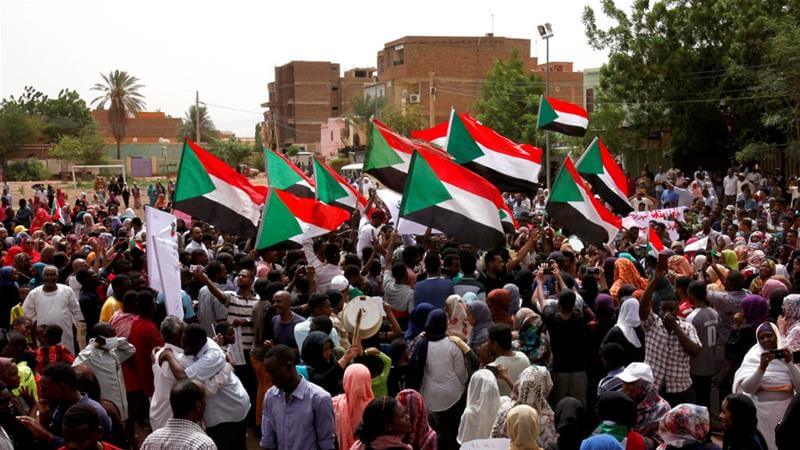


According to a report from SBS-AAP, Cuba is considering the use of cryptocurrency in order to bolster its finances. The country’s Communist government announced on state-run TV that it would potentially use crypto as part of a package aimed to boost incomes for as much as a quarter of Cubans and assist with market reforms. The announcement comes in the wake of new sanctions from the United States and Brazil on Cuba this week with the hopes to further cripple Cuba’s ally Venezuela. Venezuela implemented its own form of cryptocurrency last year to curb hyperinflation and economic catastrophe.

In a letter to EU High Representative Federica Mogherini and foreign ministers, Human Rights Watch argued that the EU should impose targeted sanctions against high-level Nicaraguan officials implicated in gross human rights violations and condition financial support to Nicaragua’s National Police. The European Union should increase pressure on the Nicaraguan government to curb human rights violations by police and other officials in the wake of anti-government protests, The crackdown on anti-government protests by Nicaragua’s National Police and armed pro-government groups that began in April 2018 led to more than 300 deaths and 2,000 people injured. The HMR wasn’t the only organization to condemn the gross human rights violations, The Organization of American States (OAS) General Assembly adopted a joint resolution condemning the Nicaraguan government on Wednesday.

Australian Prime Minister Scott Morrison has said that Alek Sigley is “released and safe” after being detained by the North Norean government. Last week, his family and friends lost contact with him, sparking fears he might have been detained, and these concerns were true. Sigley was the only “Austrialian living in North Korea” where he was pursuing a master’s degree and running a tourism business in Pyongyang. His release was said to comes after a meeting between officials from the Swedish embassy in Pyongyang and the North Korean government. Australia does not have its own embassy in the North Korean capital, but Sweden does, and often acts as a liaison for countries. It is not known why the student, a fluent Korean speaker, had been detained.

The U.N. envoy for Myanmar said Monday that progress on alleviating the crisis that led more than 720,000 Rohingya Muslims to flee to neighboring Bangladesh has been slow and if there is no action it will be time to “ring the alarm bell.” Special UN Envoy on Myanmar Christine Schraner Burgener, said that there have been “little changes on the ground” to the situation for Rohingya Muslims citing discrimination, military presence, and last week when Myanmaar suspended internet service cuasing a communication black out in Rhakine.

On Sunday, after hobnobbing with G-20 leaders in Osaka, Japan, President Donald Trump made one of the most audacious diplomatic photo-ops in history when he crossed over the DMZ and into Norea Korea shaking hands with North Korea’s leader Kim-Jong Un. In doing so, President Trump became the first sitting American President in history to set foot in North Korea. The meeting was set up via Twitter with less than 24 hours. Both leaders said that the meeting marked a reboot to two previous failed summits regarding North Korea’s nuclear capabilities. While the meeting was historic, foreign policy experts criticized Trump’s tactics arguing the exchange should be the last step, not the first, to a nuclear arms agreement. Democrats parroted these concerns as presidential candidates criticized him for “coddling with tyrants” and “legitimizing dictators.”
President Trump also came under fire for his jingoistic July 4th celebration that boasted the US’ military prowess. The “Salute to America” event featured military flyovers and fireworks. For the first time in recent memory, the Independence Day celebration featured a military parade. Opponents accused Mr. Trump of wasting money and politicizing the holiday ahead of his re-election campaign.

Cambodian Prime Minister Hun Sen on Monday said that his country “will not bow down to any advice from foreigners” as he prepares to head to Geneva, where he is expected to address a United Nations human rights session on July 4 about Cambodia’s human rights progress. Despite Sen’s claim that human rights in Cambodia are improving, an activist and former elected official, Sun Yen, was beaten nearly to death in Cambodia’s Kampong Thom province by a group of unidentified men. Yen is a member of the banned opposition Cambodia National Rescue Party (CNRP), which was disbanded in November 2017 for its alleged role in a plot to overthrow the government. The move was part of a wider crackdown by Sen on political opposition, NGOs, and the independent media that paved the way for Sen’s Cambodian People’s Party (CPP) to win all 125 seats in parliament in the country’s July 2018 general election.

Eskom, a South-African based eclecticity provider, announced that Zimbabwe has failed to pay $10 million (R140 million) of its outstanding debt, despite undertakings by Zimbabwe Finance Minister Mthuli Ncube. Moreover, Eskom is refusing to be paid in Zimbabwean dollars, which is experiencing one of the highest levels of hyper-inflation in recorded history, and instead in South African Rand or in USD. Zimbabwe has been forced to implement power-cuts due to its inability to pay for foreign electricity imports and a severe drought leading to fewer outputs by its hydro-plant. The announcement marks another step towards social, political, and economic turmoil: if Zimbabwe is unable to produce electricity, other sectors of its mineral and oil rich economy will ultimately fail. Some Zimbbwean’s power is only available for a few hours in the middle of the night.
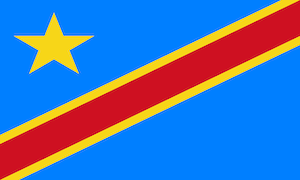
President Felix Tshisekedi described interethnic bloodshed in DRC’s northeast as “attempted genocide” after scores of people were killed and tens of thousands displaced. The leader of the Democratic Republic of the Congo said the violence appeared to be a “plot” and vowed to “find out the truth” about who was behind the deadly unrest. Fighting in Ituri province between militias connected to Lendu farmers and Hema herders has killed at least 160 civilians since June 10, Tshisekedi said on Tuesday at the end of a three-day visit there. Earlier this week, Amnesty International called on the DRC to withdraw its armed forces from the Fungurume mines to overt bloodshed after reports found that the DRC sent approximately a thousand of soldiers to protect Chinese Mining Incorporation.

Following the death of a navy officer in custody over an alleged coup plot, Venezuela’s opposition leader Juan Guaido said on Tuesday there were no plans to restart talks with the “murderous dictatorship” of President Nicolas Maduro. President Maduro has not said how the officer died, but a sixteen-page UN report released this week details the injuries inflicted on the navy captain, “including electric shocks, suffocation with plastic bags, water boarding, beatings, sexual violence, water, and food deprivation, stress positions and exposure to extreme temperatures”. Despite opposition leader Guaido’s statement that there would “never” be a time to negotiate with a “dictatorship” and the UN report, President Maduro was optimistic about future talks with the opposition: there “will be good news in the coming weeks about how well the contact, negotiation and pre-agreement processes are going.”

This week in Manila, approximately 2,500 people gathered to honor the 90-year-old widow of the late dictator Ferdinand Marcos and celebrate a birthday party for Imelda Marcos, the former first lady of the Philippines. However, more than two hundred and fifty guests fell ill with suspected food poisoning after the celebratory meal at a Ambulances rushed vomiting friends and supporters from a sports stadium Although Marcos was toppled by a peaceful uprising in 1986, the family is still revered by many in the Philippines and has made a political comeback in recent years.

Human Rights organizations have urged Thai authorities to investigate attacks on pro-democracy activists after one was beaten and left unconscious on a pavement last week. Amnesty International submitted open letters to Thailand’s defense minister and its police commissioner on Wednesday asking them to bring justice to the attackers. who have targeted three vocal pro-democracy activists on multiple occasions since the military seized power in a coup in 2014. In the letter, AI asserted that the attacks against the activists “appear to fit a pattern of systemic violence timed to coincide with their efforts to draw attention to perceived election irregularities and problems relating to the formation of a new government”.

Vietnam was a direct beneficiary of the trade-war between the United States and China; however, there were worries that the country might be on the receiving end of the tarifs. To combat these fears, Vietnam signed a “historic” trade deal with the European Union that effectively cut 99% of all tariffs between Vietnam and the EU. On Thursday, President Donald Trump put a 456% tariff on imported Vietnameese steel amid a surge in exports to the U.S. and growing evidence of Chinese and other manufacturers diverting their goods via the Southeast Asian nation to bypass Chinese tariffs. In response, Vietnam Prime Minister Nguyen Xuan Phuc ordered government officials to intensify their crackdown on fraudulently mislabeled products for exports and closely monitor U.S. reactions

President Hassan Rouhani said on Wednesday that Iran will boost its uranium enrichment after July 7 to whatever levels it needs beyond the cap set in the landmark 2015 nuclear deal, defying US efforts to force Tehran into renegotiating the pact. Early this week, Iran announced has stockpiled more low-enriched uranium than is permitted under the accord. While the situation looks more like a disaster than a diplomatic triumph when both the United States and Iran are hitting back, Iranian Minister Mahmoud Alavi was cited by the state-run IRNA news agency as saying “negotiation between Iran and America will take place if the supreme leader gives the permission.”

On Wednesday, Sudan’s protest and opposition leaders resumed face-to-face talks with Sudan’s ruling Transitional Military Council (TMC). TMC and the opposition coalition have struggled for weeks over what form Sudan’s new government should take after the military deposed long-time president Omar al-Bashir on April 11. The meditators of the talk were done by Ethiopian Prime Minister Abiy Ahmed who flew down after talks broke down. After months of peaceful protest and a violent military crackdown, Sudan’s military leaders reached an agreement with the opposition alliance to share power until elections can be held. The two sides agreed to rotate control of the sovereign council for at least three years with the first president being picked by the TMC. They have also pledged to form an independent technocratic government and to investigate the aforementioned violence of recent weeks. News of the agreement reportedly sparked frenzied street celebrations.

On Wednesday, President Vladimir Putin said that Russia is ready to restart discussions with the U.S. over arms control and that recently there have been signs that Washington is beginning to consider resuming bilateral dialogue on a wide-ranging strategic agenda,” Despite fears that both countries pulling out of the Intermediate-Range Nuclear Forces Treaty (INF treaty) signed in 1987 would lead to an arms-race, both countries have denied that the collapse of a significant nuclear missile treaty between the two nations would prompt an arms race.

On Thursday, a UN official has said that the attack on a detention centre outside the Libyan capital attack, which killed more than 44 migrants, could constitute a war crime. At least 130 people were injured in the attack, which the Libyan government blamed on an airstrike by forces loyal to a warlord, General Khalifa Haftar. Thousands of migrants are being held in government-run detention centres in Libya. Most of the dead are believed to be sub-Saharan Africans who were attempting to reach Europe from Libya.
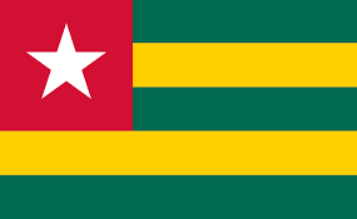
On Sunday, Togo held its first local elections in 32 years where the country’s 3.4 million eligible voters were called to elect 1,527 municipal councilors to six-year terms, renewable twice, in 117 towns. However, most opposition parties are boycotting the election. The West Africa Nation has been governed by a single family for over three decades, and President Faure Gnassingbe stated the elections “mark a major advance in the establishment of democracy.” Gnassingbe has been in power for nearly 15 years since succeeding his father Eyadema Gnassingbe, who ruled the country with an iron fist for 38 years. Turnout was low with the polling stations visited by AFP reporters showing an average abstention of 75 percent.

A UN expert said in a report that the human rights situation in Eritrea shows no sign of improvement since it signed a peace agreement with neighboring Ethiopia last year, ending two decades of war. UN special rapporteur lamented that the peace deal failed to bring widespread abuse and violations to an end stating that “the dividends of peace are not yet benefiting ordinary Eritreans, nor are there any signs to suggest they will.” Despite an end to the conflict, Eritreans lack political rights and the government does not allow for dissent.

For the past month, protesters have been demanding the withdrawal of a bill that would allow extraditions to the Chinese mainland. The anger against the bill has grown against Hong Kong authorities and morphed into a wider political crisis. On Monday, a massive peaceful protest in which organizers say more than half a million people marched through the city on the anniversary of Hong Kong’s 1997 return to Chinese rule. However, during the peaceful parade, a much more violent a riot emerge when Hong Kongers stormed and occupied the legislative night clashing with police on Monday night. On Thursday, the Hong Kong police made its first arrest.

Iraq declared victory over the Islamic State of Iraq and the Levant group (ISIS or ISIL) in late 2017, and has continued to carry out arrests of suspected fighters, The Iraqi government does not provide figures on detention centers or prisoners, but some studies have estimated 20,000 are being held for alleged ISIL links. A recent investigation by the Human RIghts Watch reveals that the conditions for the suspects charged with “terrorism” are held in “degrading” conditions. The government does not allow the suspects to access a lawyer and many have already been charged but are still held in prison for months on end. One prison with a max capacity of 2,500 had over 4,000 prisoners.
Istanbul, Turkey: Hundreds of protestors marched the streets of Istanbul, attacking Syrian shops and residential areas after allegations that a young Syrian boy verbally harassed a young Turkish girl. A group of Turkish youths reportedly damaged several Arab businesses in the Syrian neighborhood on Saturday night before police dispersed the crowd, arresting 18. All 18 were released. Local government officials denied a physical assault had taken place.
Amsterdam, Netherlands: Amsterdam’s first female mayor is facing a battle with sex workers in the city’s famous red-light district after raising the prospect of closing it down. Femke Halsema, a former leader of the national Green party who became mayor last year, is under fire for suggesting that the city “must dare to think about the red-light district without prostitution”.
Xinjiang, China: Thousands of Muslim children in China’s western Xinjiang region are being separated from their parents in what a new study calls a “systematic campaign of social re-engineering and cultural genocide”. The research sheds light on what happens to the children of so-called “double-detained” parents – when both a mother and father have been abducted by the state into what it calls compulsory “re-education” facilities. The UN says China has detained more than one million minority Muslims, mostly ethnic Uighurs, since a dramatic escalation of the policy in the spring of 2017.
[et_pb_section][et_pb_row][et_pb_column type=”4_4″][et_pb_image admin_label=”Image” src=”https://canvasopedia.org/wp-content/uploads/2018/08/bangladeshi-students-march-along-a-street-during-a-student-protest-in-picture-id1011816026.jpg” show_in_lightbox=”off” url_new_window=”off” animation=”left” sticky=”off” align=”left” force_fullwidth=”off” always_center_on_mobile=”on” use_border_color=”off” border_color=”#ffffff” border_style=”solid” /][et_pb_text admin_label=”Text” background_layout=”light” text_orientation=”left” use_border_color=”off” border_color=”#ffffff” border_style=”solid”]
Students protest in the streets of the capital of Bangladesh, Dhaka, in response to a lack of government enforcement for traffic regulations. (MediaOne, India)
[/et_pb_text][et_pb_text admin_label=”Text” background_layout=”light” text_orientation=”left” use_border_color=”off” border_color=”#ffffff” border_style=”solid”]

On Sunday, the scientist suspected to be the head of Syria’s chemical weapons program was killed in a car bombing. Pro-government outlets described the attack as an assassination. On Wednesday, the New York Times corroborated this to an extent, describing his death as the result of a targeted assassination by the Israeli spy agency Mossad.
At least one Druze hostage abducted from the Sweida province in Syria last week has been confirmed to be executed. Videos of the victim were sent to his family in Sweida. The Druze, a religious minority, practice a secretive faith that is seen as an offshoot of Islam. They make up approximately 3% of the Syrian population. They have been targeted by the Islamic State, which views them as heretics.
The wife of Junpei Yasuda, a Japanese journalist who was recently discovered to be in the captivity of the Islamic State, made a broad appeal for the return of her husband, safe and sound. Yasuda is only one of the latest of many journalists targeted in Syria by the Islamic State; various journalists of many different nationalities have been kidnapped and even killed by the Islamic State. According to the Committee to Protect Journalists, 122 journalists have been killed in Syria since the start of the conflict.
[/et_pb_text][et_pb_text admin_label=”Text” background_layout=”light” text_orientation=”left” use_border_color=”off” border_color=”#ffffff” border_style=”solid”]
On Monday, over 25 opposition groups took to the streets of Potosi, a colonial city with historical importance to Bolivia, in order to protest the government’s continued practice of ignoring the results of a referendum that would force the Bolivian presidency to obey a term limit. These protesters, known collectively in relation to the referendum as the 21F movement, are concerned that the ignored referendum represents a further backslide of Bolivian democracy. In response, police barricades were put up and protesters were stopped from getting into the ceremony; organizations off of the official list were not allowed to mount their protests until after the speech of President Evo Morales and Vice President Alvaro Garcia Linera. During Morales’ speech, however, members of the opposition party reportedly shouted “Bolivia says no,” a reference to the slogan of the pro-referendum protesters.
Activists involved within the 21F movement stated on Tuesday that they would organize a national strike to take place in the event that President Evo Morales is reelected in the coming elections, which will take place in 2019. On the same day, Morales announced that a bilateral event would be held between Venezuela and Bolivia to express support of Venezuelan president Nicolas Maduro in the wake of an alleged attack on Maduro’s life.
[/et_pb_text][et_pb_text admin_label=”Text” background_layout=”light” text_orientation=”left” use_border_color=”off” border_color=”#ffffff” border_style=”solid”]
 Nicaragua
NicaraguaThe continued violent crackdown against anti-government protesters has led to a massive drop in Nicaragua’s tourism industry, which employed a significant population on the western coast of the country. This has impacted the economic situation of the local population massively; of the 120,000 people previously employed in the tourism sector, approximately 70,000 have lost their jobs. Although the beach towns on Nicaragua’s coast have been spared the bloodshed plaguing other parts of the country, these areas have been devastated financially.
On Monday, the Nicaraguan Association for Human Rights (ANPDH) announced that it was forced to close its offices in Nicaragua due to death threats. The NGO also claimed that it received information that there had been plans to accuse staffers of fake crimes. Although ANDPH claims that such closures are temporary, its executive secretary and other staffers have left the country for their own safety. The Inter-American Commission on Human Rights set the latest death toll of the conflict in Nicaragua at 317 people dead, including 21 police officers and 23 children.
[/et_pb_text][et_pb_text admin_label=”Text” background_layout=”light” text_orientation=”left” use_border_color=”off” border_color=”#ffffff” border_style=”solid”]
 North Korea
North KoreaAlthough US president Donald Trump has claimed that negotiations with the DPRK have been wildly successful, White House security advisor John Bolton has claimed that no one is “starry-eyed” regarding the progress that North Korea has actually made towards disarmament. However, the Trump administration continues to make conciliatory gestures towards the DPRK – including allowing the United Nations Security Council to agree to a series of guidelines that would allow it to become easier for humanitarian aid to enter North Korea. This action – a surprising move, given the DPRK’s history of utilizing aid to favor specific populations – represents a softer action than one would expect of the United States, given Trump’s harsh rhetoric towards the northeast Asian dictatorship.
On Wednesday, the foreign minister of North Korea met with the Iranian President, as well as his counterpart Jarvad Zarid. The two diplomats called for expanded relations between the DPRK and Iran, particularly in the context of pressures exerted by the Trump administration against both governments. South Korean officials also visited the DPRK for a joint inspection of forests in the Mount Kumgang area of North Korea for the purposes of determining the best ways to combat harmful insects and disease.
[/et_pb_text][et_pb_text admin_label=”Text” background_layout=”light” text_orientation=”left” use_border_color=”off” border_color=”#ffffff” border_style=”solid”]
 Myanmar
MyanmarAfter rival armed groups clashed again in Myanmar’s Shan state, more than 800 villagers were forced to flee their homes on Monday. As a result of this fighting between the Shan State Army-South and Ta’ang National Liberation Army, the villagers were forced to stay at temporary camps near Buddhist monasteries. The two groups have been fighting since 2015, after the TNLA was excluded from signing an accord between multiple ethnic groups and the government.
On Tuesday, Bangladesh’s UN ambassador said in a letter that not enough has been done by the Myanmar government to facilitate the conditions for a safe and sustainable return of Rohingya to Myanmar. On the first anniversary of the start of Myanmar’s violent crackdown on Rohingya populations, the United Nations Security Council will be addressed with reference to the crisis by current Secretary-General Antonio Guterres.
[/et_pb_text][et_pb_text admin_label=”Text” background_layout=”light” text_orientation=”left” use_border_color=”off” border_color=”#ffffff” border_style=”solid”]
 USA
USAOn Monday, the United States announced its intent to reimpose damaging sanctions on Iran. Although the Trump administration denies that such an action has been made with regime change in mind, Iranians continue to protest a deteriorating economy. This clearly represents an increase in pressure from the American government towards its counterparts in Iran.
Emails leaked to Foreign Policy magazine showed that Jared Kushner and the Trump Administration have been trying to pressure officials to “disrupt” the United Nations Relief and Works Agency (UNRWA), which works with Palestinian refugees in the near East. Only days after this revelation, the Trump administration revealed its decision to cut funding to the agency by more than half, something that will leave the refugee agency scrambling for more funding. Despite these cuts, the United States remains the biggest donor to the UNRWA
Additionally, the United States announced on Wednesday that it would impose sanctions on the Russian Federation in response to the poisoning of a former Russian spy in the United Kingdom, which took place this past March. The second phase of these sanctions will target industries such as Aeroflot, Russia’s state airline, as well as all imports and exports.
The State Department also specifically called out Russia in a statement warning against foreign interference in American democracy, despite the White House’s apparent reluctance to do so.
[/et_pb_text][et_pb_text admin_label=”Text” background_layout=”light” text_orientation=”left” use_border_color=”off” border_color=”#ffffff” border_style=”solid”]
 Cambodia
CambodiaDespite international condemnations of the flawed elections in Cambodia, Prime Minister Hun Sen announced on Monday that he will give a speech to the United Nations General Assembly. Sen has stated that this move is meant to show that Cambodia doesn’t require “stamps of approval” from anyone. In response to July’s election, the United States has stated that it will consider steps such as visa restrictions in response to the elections controversy. Various other countries – including major donors such as Australia, Canada, and the European Union – have voiced concerns about the credibility of the elections, although they have yet to commit to withdrawing aid.
[/et_pb_text][et_pb_text admin_label=”Text” background_layout=”light” text_orientation=”left” use_border_color=”off” border_color=”#ffffff” border_style=”solid”]
 Mexico
MexicoMexico’s incoming president, Andres Manuel Lopez Obrador, has pledged to overhaul the strategies in place for Mexico’s failed war on drugs, a conflict that has left an estimated 200,000 dead. He is considering tactics such as the decriminalization of marijuana, limited amnesty, creating truth commissions to evaluate episodes of violence, and hosting daily meetings regarding the question of security. Such considerations are novel among Mexican presidents, particularly those to do with amnesty, something that gives observers hope that a change may, in fact, take place.
[/et_pb_text][et_pb_text admin_label=”Text” background_layout=”light” text_orientation=”left” use_border_color=”off” border_color=”#ffffff” border_style=”solid”]
 The Maldives
The MaldivesPresident Abdulla Yameen has yet to submit his application for the September elections – and as the deadline is this Friday, the opposition has claimed that this is due to fear. Yameen has also recently drawn criticism for his remarks on Tuesday regarding Ahmed Rilwan, a journalist who disappeared in August 2014. Despite a massive investigation and an Al-Jazeera report claiming that the government was involved, possibly as high-up as the president, no definitive evidence as to the whereabouts of Rilwan has been found. Yameen referred to Rilwan as “dead” in his speech, which many have taken as an implicit confirmation of Yameen’s knowledge of Rilwan’s death.
[/et_pb_text][et_pb_text admin_label=”Text” background_layout=”light” text_orientation=”left” use_border_color=”off” border_color=”#ffffff” border_style=”solid”]
 Zimbabwe
ZimbabweVarious human rights groups have condemned widespread repression taking place in Zimbabwe as tensions continued to erupt over the results the historic elections. Although it is currently difficult to confirm, the opposition party has reported abductions, violence, and sexual assaults occurring at the hands of unidentified men, rumored to be government security forces.
Members of Zimbabwe’s opposition have gone into hiding. Most recently, opposition leader Tendai Biti was deported back to Zimbabwe after seeking asylum in Zambia. He is wanted by the police for reportedly urging violence in the aftermath of the elections and prematurely declaring the opposition candidate, Nelson Chamisa, as the winner. UK officials spoke to both Zimbabwean and Zambian authorities to ensure that Biti would remain unharmed.
[/et_pb_text][et_pb_text admin_label=”Text” background_layout=”light” text_orientation=”left” use_border_color=”off” border_color=”#ffffff” border_style=”solid”]
 Laos
LaosAfter the breach of a newly constructed dam last month, Laos has suspended any considerations of new hydropower projects, choosing instead to focus on safety inspections for existing dams and reviews of policy. Lao citizens displaced by the flooding are living in tent shelters in close quarters, something that is allowing diseases to spread. The death toll following the collapse has climbed to 31, with 130 individuals still considered missing according to Ounla Xayasith, the deputy governor of the affected province.
[/et_pb_text][et_pb_text admin_label=”Text” background_layout=”light” text_orientation=”left” use_border_color=”off” border_color=”#ffffff” border_style=”solid”]
Twenty Vietnamese women arrested last month for protesting are being threatened for seeking to appeal their jail sentences. According to their lawyer, Dang Dinh Manh, the women are being threatened with sexually transmitted diseases if they appeal their convictions for “disrupting public order” after their participation in protests against allowances for foreign governments in special economic zones and the adoption of a cybersecurity law that has drawn criticism for its potential in limiting free speech. This news was announced by Manh only a day after Amnesty International called upon Vietnamese authorities to investigate the death of a farmer who took part in the same protest. He was allegedly tortured in police custody.
[/et_pb_text][et_pb_text admin_label=”Text” background_layout=”light” text_orientation=”left” use_border_color=”off” border_color=”#ffffff” border_style=”solid”]
 The Democratic Republic of the Congo
The Democratic Republic of the CongoThe African Union called for the Democratic Republic of the Congo to work to ensure that its elections, coming up this December, are peaceful, transparent, and inclusive. This comes on the heels of protests in the southeastern city of Lubumbashi by supporters of opposition leader Moise Katumbi, who was refused entry into the country. This has barred him from registering for the upcoming elections; the deadline for signing up to run was August 8th.
The latest Ebola outbreak in the DRC has taken as many as 33 deaths according to the health ministry, with a suspected up to 43 additional individuals infected. According to the World Health Organization, the “active conflict” in the area may provide a massive barrier for health providers looking to aid those affected by the latest outbreak. The health ministry of the DRC announced a new Ebola virus outbreak mere days after the previous one was declared over. Four Ebola cases were confirmed in the North Kivu province, and on Thursday, international experts set up a laboratory in a city close to where the outbreak occurred.
[/et_pb_text][et_pb_text admin_label=”Text” background_layout=”light” text_orientation=”left” use_border_color=”off” border_color=”#ffffff” border_style=”solid”]
 Colombia
ColombiaIvan Duque, Colombia’s new president, was sworn in on August 7th. At 42, he is the youngest president in Colombia’s history. Duque ran on a platform emphasizing the need to crack down on crime and corruption and has already begun to discuss these goals with officials from the United States, including Vice President Mike Pence. Only a few hours prior to the swearing-in ceremony, an earthquake shook the nation’s capital, as well as several neighboring departments. This earthquake had a magnitude of 6.1 at the epicenter and 5.4 elsewhere and was considered to be relatively mild.
Prior to Duque’s inauguration on Tuesday, former president Juan Manuel Santos announced that Colombia would be recognizing the Palestinian state. The Israeli embassy to Colombia described this move as a “slap in the face” and a shock. In the letter penned by Santos, he claimed that this move is the result of a renewed commitment to brokering peace in the Middle East. Duque’s administration has stated that this move is under review before a commitment is made.
[/et_pb_text][et_pb_text admin_label=”Text” background_layout=”light” text_orientation=”left” use_border_color=”off” border_color=”#ffffff” border_style=”solid”]

After an assassination attempt against Venezuela’s President, Nicolas Maduro took place on Saturday, Venezuelan authorities have ordered the arrest of a top opposition leader, Julio Borges. Borges, who is currently in Colombia, has not been able to be reached for comment; however, six people were arrested by the government, including one opposition lawmaker. As a result of the worsening situation in Venezuela, Brazil temporarily shut its borders on Monday. Officials in border states such as Roraima are concerned that they lack the infrastructure to properly handle a large influx of people; however, the majority of Brazilian central government officials oppose the closing of any borders, as they feel that Brazil has a responsibility to help the victims of Venezuela’s ongoing humanitarian crisis.
According to Nikki Haley, the United States Ambassador to the United Nations, Maduro is the biggest obstacle to ameliorating the situation in Venezuela. She also pledged that the United States government will give Colombia $9 million USD in aid to help provide for the hundreds of thousands of Venezuelan refugees seeking refuge in Colombia.
[/et_pb_text][et_pb_text admin_label=”Text” background_layout=”light” text_orientation=”left” use_border_color=”off” border_color=”#ffffff” border_style=”solid”]
 Malaysia
MalaysiaFormer Prime Minister Najib Razak, who was arrested in July, was charged on Wednesday with three counts of money laundering linked to his now-infamous 1MDB scandal. Razak is also facing time for counts of abuse of power and breach of trust and has pleaded not guilty to these counts.
The Malaysian government has come under fire for homophobic policies leading to the removal of portraits of two activists – a transgender woman and a gay man – from a festival meant to celebrate Malaysian arts. The transgender activist, Nisha Ayub, has expressed concern that the action of removing the portraits may lead to an uptick in the amount of violence targeting transgender individuals, something that is already a huge issue globally. This is, in particular, the result of the director of Islamic affairs, Mujahid Yusof Rawa, who explicitly stated that the promotion of LGBT culture is not supported in Malaysia.
[/et_pb_text][et_pb_text admin_label=”Text” /][et_pb_text admin_label=”Text” background_layout=”light” text_orientation=”left” use_border_color=”off” border_color=”#ffffff” border_style=”solid”]
 Cuba
CubaThe Cuban Communist Party this week stated on Tuesday that new regulations would allow for farmers to lease double the amount of land that they are currently able to own. This is in an attempt to decrease the level of dependency that the Cuban government has on food imports, with approximately 60% of food items being imported from outside of the island state.
For the first time in history, the Cuban government will be involving Cuban diaspora members to contribute to the discussion on the draft constitution. This will be done using the internet to track contributions written by Cuban diaspora members. It is unknown to what extent these contributions will be taken into account during the formation of the new constitution.
[/et_pb_text][/et_pb_column][/et_pb_row][et_pb_row][et_pb_column type=”2_3″][et_pb_text admin_label=”Text” background_layout=”light” text_orientation=”left” use_border_color=”off” border_color=”#ffffff” border_style=”solid”]
Other News
The Philippines — On Thursday, the Philippine Navy tested its first ever aquatic missile system, manufactured by Israel. (Business Insider)
Poland — The Polish government has called for “repolonisation,” a concept extolling nationalism – especially economic patriotism. This has been illustrated most recently in a push to nationalize banks in Poland, with a strong pushback against foreign banks. (The Economist)
Thailand — After the rescue of the 12 young Thai soccer players and their coach from their three-week stint in a flooded cave, three of the soccer players and their coach have been granted Thai citizenship, in a move lauded by the UNHRC. (Time)
Pakistan — Analysts have stated that Pakistan is currently on the brink of economic disaster, with foreign exchange reserves at four-year lows. It is expected that Pakistan will need a bailout from either the IMF or China, both of which have potentially major drawbacks. (CNBC)
Bangladesh – After the death of two students in a traffic accident in late July, Bangladesh’s college and high school students took to the streets to enforce Bangladeshi traffic laws, which reportedly are not enforced due to corruption. According to WHO, there were between 17,349 and 25,283 road deaths in Bangladesh in 2013. (BBC)
[/et_pb_text][/et_pb_column][et_pb_column type=”1_3″][et_pb_image admin_label=”Image” src=”https://canvasopedia.org/wp-content/uploads/2017/11/logo_CANVAS-1.jpg” show_in_lightbox=”off” url_new_window=”off” animation=”left” sticky=”off” align=”left” force_fullwidth=”off” always_center_on_mobile=”on” use_border_color=”off” border_color=”#ffffff” border_style=”solid” /][/et_pb_column][/et_pb_row][/et_pb_section]
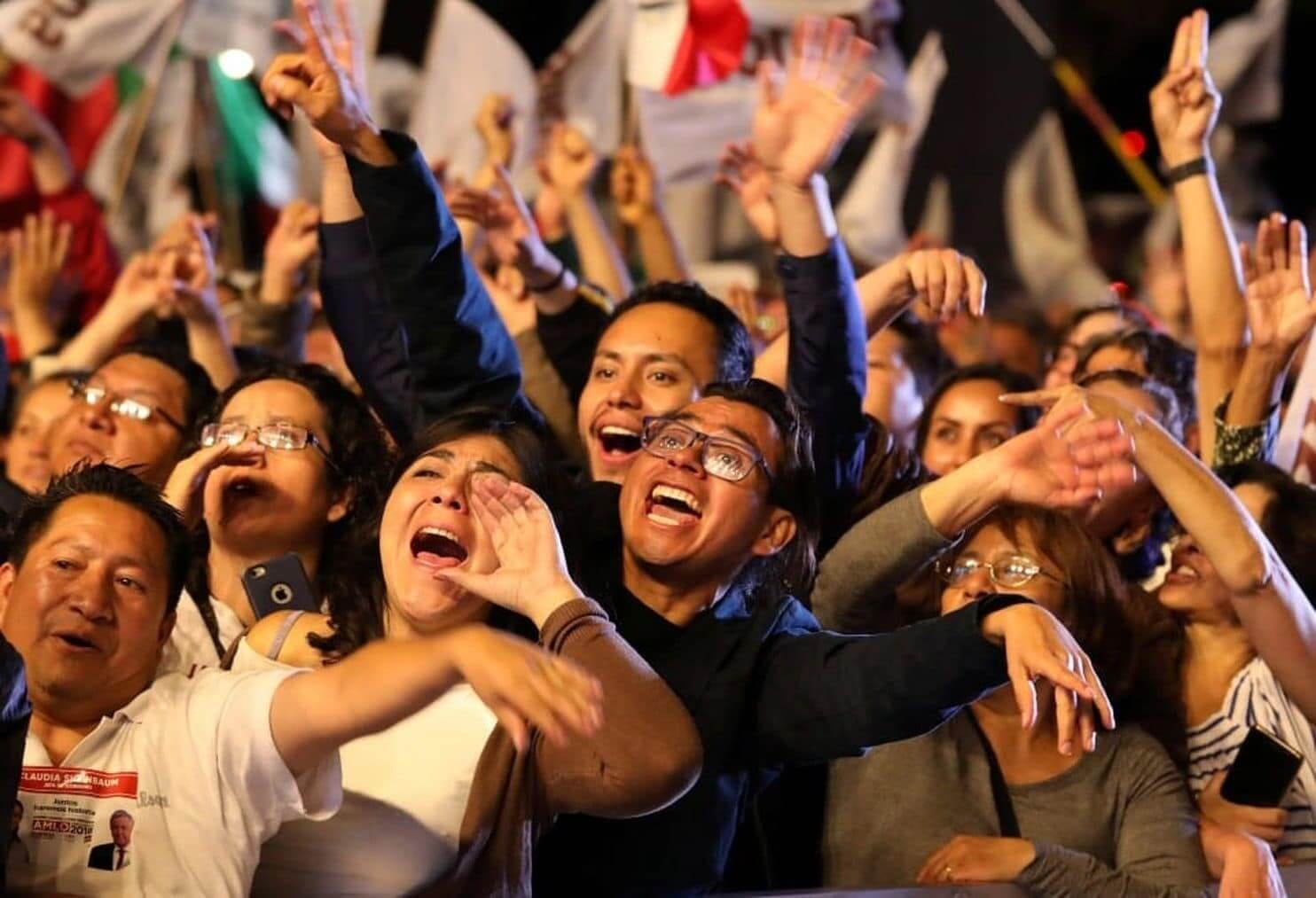
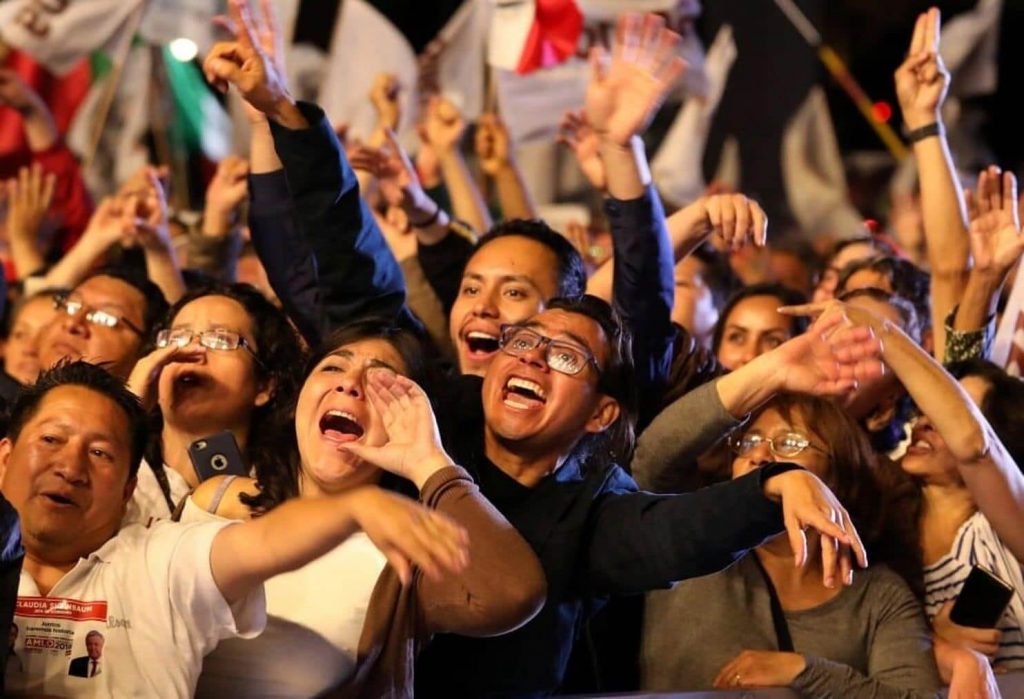
Supporters of President-Elect Andres Manuel Lopez Obrador gathered in Mexico City after the Sunday election. Reuters, Goran Tomasevic.

The Assad government’s offensives in Deraa province have intensified, and the regime now controls most of the region just two weeks after initial attacks. Jordan has diplomatically intervened, sparking a new round of negotiations between Russia and the rebels in the southwestern region. However, these efforts have been unsuccessful in bringing safety to Deraa province’s 800,000 civilians. In response, Jordanians have been working to supply aid to the Deraa refugees.
Syrian refugees who have fled to Lebanon are continuing their return, with uncertainty and cautious hope.
The US’s stance on Syria took a sharp turn this week. US National Security Adviser John Bolton stated that President Trump is not opposed to the reinstatement of Assad’s regime. In return, the US hopes to have Russia’s help in removing Iran from Syria. Trump and Russian Premier Vladimir Putin are scheduled to discuss this issue on July 16th.
Similarly, Israel, also sensing that Assad’s complete takeover is imminent, has demanded Iranian withdrawal from the country. Furthermore, Israel has ramped up its military presence in the Golan Heights frontier, and occupation near its border with Syria. These actions raise questions about the legitimacy of Israel’s occupation of the Golan Heights, its role in providing humanitarian aid, as well as its alleged neutrality in the conflict despite the numerous airstrikes it has carried out.
Iraq, on the other hand, has started constructing a fence along the Iraq-Syria border to keep ISIL members out.

This week, new reports place the death toll in Nicaragua at 309, over 1,500 injured, and 156 missing since the beginning of the violence nearly three months ago. The March of Flowers this past Saturday, a demonstration to commemorate the students killed at the initial university protests, resulted in one death and ten wounded demonstrators. Many protesters have been denied medical attention at government-run hospitals, resulting in makeshift clinics at university centers and Catholic churches manned by volunteer medical practitioners. On Monday, Amnesty International reported that an Interdisciplinary Groups of Independent Experts (GIEI) of the Inter-American Commission on Human Rights made 15 recommendations to government authorities to promote freedom among citizens without fear.
A group of multinational trade companies that includes Adidas, Patagonia, New Balance, Nike, Fanatics, Fair Labor Association, Under Armor, Gab Inc., and the American Apparel & Footwear Association signed a letter addressed to Ortega insisting on an end to the violent repression of citizens and urging the president to continue peaceful negotiations. Meanwhile, the ongoing violence has crushed the once vibrant tourist industry, leaving 200,000 people unemployed. Projections from the Nicaraguan Foundation for Economic and Social Development (Funides) projects that 1.3 million of Nicaragua’s 6.2 million people risk falling into poverty if the violence
continues.
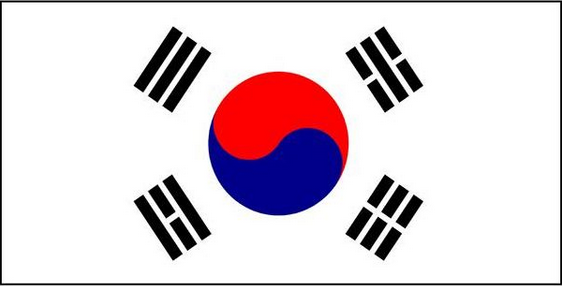

US Secretary of State Mike Pompeo arrived in North Korea this Friday amidst the country’s development of nuclear-weapon infrastructure. In spite of North Korea’s promise to denuclearize at last month’s summit, satellite images show the continuous growth of several of weapon facilities, placing special importance on Pompeo’s visit and his efforts to ease tensions between the two countries.
Influxes of Yemeni refugees in South Korea sparked national outrage and protests this week. 520,000 South Koreans have signed a petition against their government’s relaxed national immigration policy, and hundreds marched Saturday in Jeju Island and Seoul. Refugee relief organizations have allegedly received threats amidst the rising anti-refugee sentiment in the country.
The #MeToo movement is gaining ground in South Korea as former provincial governor Ahn Hee-jung is put on trial for raping his former secretary. Women also plan to boycott spending on the first Sunday of every month to protest their government’s “pink tax,” under which women’s products are priced much higher than men’s products. Both movements are testaments to growing female activism in the country, and set positive precedents for the days to come.
The South Korean government plans on implementing new policies to reverse the country’s low birth rate, including increased financial support for single parents and subsidized costs for infertility treatments.

Although Myanmar’s government has claimed that it is prepared to take back Rohingya refugees (whose numbers exceed 700,000), the Red Cross has declared that conditions are still very unsafe and inadequate for repatriation. The Rohingya people are still not guaranteed citizenship nor freedom of movement within Myanmar.
Furthermore, the government has seized large swaths of land and Rohingya villages in the northern Rakhine state under the guise of reconstruction and development. Government-built “transit camps” for refugees remain empty as refugees refuse to come back to a place where their safety is endangered. Fewer than 200 out of 700,000 displaced Rohingya people have returned to the country; the prolonged delays in repatriation are also straining relations between Bangladesh and Myanmar.
Wa Lone and Kyaw Soe Oo, two Reuters reporters, were arrested last December for their investigation of the massacre of ten Rohingya Muslims in Rakhine state. Next week, on July 9th, the court will decide whether the two will face full trial.

The trade war between the United States and China escalated as President Trump imposed a tariff on $34 billion worth of Chinese products, a significant hike which would hurt both American and Chinese consumers and producers. Chinese officials have repeatedly mentioned that, in response to the tariffs, they would tax an equal amount of American exports—including pork, soybeans and automobiles. In conjunction with tariffs imposed on foreign steel, aluminum, solar panels, and washing machines from its allied countries, there is a long-term threat on the view of the United States as a place to export. Even the Federal Reserve is finding it difficult to mitigate the pain of the trade war, and in case of recession, it will be difficult for the institution to bailout the broader economy.
On the 4th of July, activists campaigning to abolish ICE were arrested at the Statue of Liberty. Therese Okoumo, an immigrant who was born and educated in the Democratic Republic of Congo, climbed to the base of the statue and was there for several hours before the police took her into custody. At least six people were arrested for unfurling a banner demanding the abolishment of ICE. These arrests come in response to Trump’s executive order which seeks to detain families of illegal immigrants until their legal hearings have concluded.
The NATO summit is scheduled for the 11-12th of July, and President Trump has shaken decades of American defense policy by criticizing the organization. He has demanded that member nations increase their defense spending to the target of 2% of their GDP and has placed emphasize on counter-terrorism efforts. With the continued disdain of both the EU and NATO, it will be interesting to see whether history will look back on this decision as a foreign policy blunder in an effort to tackle the rising powers in the East.
The United States has also imposed sanctions over violence and corruption against three Nicaraguan individuals. Those sanctioned include Francisco Javier Diaz Madriz, Fidel Antonio Moreno Briones, and Jose Francisco Lopez Centeno who have all been accused of curtailing fundamental freedoms and spiraling unrest in the strife-ridden country.

Mexico held its largest elections ever this Sunday, with more than 1300 offices on ballots across the country. Populist frontrunner, Andres Manuel Lopez Obrador (AMLO), won 53% of the vote, the first time a president has won with the majority of the vote since multiparty elections began in 2000. He ran under his own personalistic party, the National Regeneration Movement (MORENA), in coalition with labor and far-right parties. The legislative elections have yet to yield final results, but AMLO’s coalition is expected to win a majority in both houses of Congress, giving the President-Elect a broad mandate to enact reforms.
AMLO’s election is seen as a response to rising corruption, increased violence, and strained relations with the United States. Concerns about his commitment to democratic norms have worried experts around the world as he has often rejected election results, violated campaign expenditure laws, frequently changed his policy stances, and disregarded institutional guardrails in the country. Business leaders were particularly rattled by his promises of expanding social program reforms and rolling back the privatization of the oil sector. AMLO met after the election with the business community in order to assuage concerns, and promised to establish a government-funded apprenticeship program.
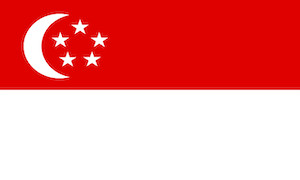
Minister of Singapore, Ng Eng Hen, told reporters last Friday that the nation faces high terrorism threat levels stemming from radicalized, returning fighters and citizens radicalizing at home via the internet. Ng postulated that the recent increased number of threats and attacks in surrounding Southeast Asian countries is cause for structural changes in Singapore’s military as well as the need for stronger regional alliances to help combat transnational terrorist threats.
South Korean President Moon has announced plans to meet with Singaporean President Halimah Yacob and Prime Minister Lee Hsien Loong in an effort to assess bilateral relations and discuss further cooperation. Presidential office spokesman Kim Eui-kyeom also said the President Moon plans to discuss denuclearization of the Korean Peninsula.
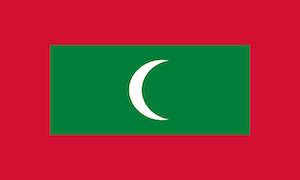
The Indian External Affairs Ministry has expressed concern over the announcement of Maldives’ elections without democratic institutions. India expressed the need for the rule of law and an independent judiciary in the country before the elections are held in September this year. Reporters in Maldives who cover court cases are being targeted by penal code charges. The new amendment to the penal code would make it illegal for journalists to portray a court as lacking the capacity to rule independently and without influence. It will also make it illegal to use audio, video or any electronic equipment inside the courtroom.
The four-party Joint Opposition in Maldives declared their support for the Maldivian Democratic Party’s (MDP) parliamentary group leader, Ibrahim Mohammed Solih in the upcoming elections. This came after ex-President and MDP leader Mohammed Nasheed unilaterally decided that he would not be challenging President Abdulla Yameen Abdul Gayoom in the upcoming elections. The ex-President has continuously expressed concern over the lack of the rule of law and democratic apparatus in the country and has cited them as reasons for his decision. President Yameen’s campaign places emphasis on Islam and infrastructure. He portrays the opposition as anti-Islamic and urges the country to choose economic development over secular ideals.
Diego García-Sayán, a United Nations Human Rights Expert, has expressed dismay at the arrest of two justices who were involved with the February 1 Supreme Court decision which ordered the reinstatement of 12 suspended Members of the Parliament and release and retrial of nine political leaders. Maldives has also made a re-appearance on the US human trafficking watch list and has been downgraded over failure to meet minimum standards of elimination.

Campaigning for Zimbabwe’s presidency continues after last week’s blast which targeted a rally for incumbent President Mnangagwa. Fears of violence continue, especially in light of the extensive violence following the 2008 elections. Both Mnangagwa and opposition leader Nelson Chamisa have denounced the violence and returned to the campaign trail.
The currency crisis in the country continues as the new Bond Notes lose value despite being theoretically tied to the US dollar. Fears of further inflation and a collapse of the Bond currency are partially fueled by the uncertainty of the upcoming elections, and foreign investors are reluctant to commit before the results.
The United States Agency for International Development has stopped funding three key civil society groups in the country. One of these groups is at the forefront of an election validation project aimed at ensuring the July elections are free and fair.
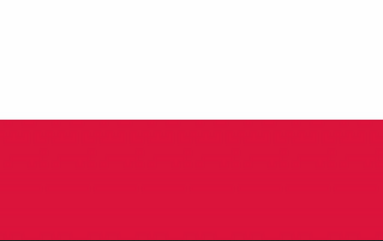
Poland’s collapsing judiciary crisis escalated to its highest point this week, as the ruling Law and Justice Party pushed to purge the Supreme Court of opposition. The Parliament is trying to enforce a law that would require all justices older than 65 to request permission from the president in order to remain on the court. The law is widely seen as a push towards making the judiciary subservient to elected politicians. President of the court, Malgorzata Gersdorf, showed up to work despite being in violation of the new law.
Solidarity leader Lech Walesa called for mass protests if the government continues to interfere with the judiciary. Tens of thousands of protestors all over Poland gathered to express their concern for the state of the rule of law in the country.
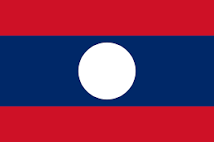
Vietnam’s and Laos’s justice bodies came together this past week to implement border security measures and to streamline how to deal with undocumented immigration and marriage. This bilateral collaboration resulted in new laws which grant citizenship to undocumented immigrants, so long as both countries hold up all parts of the new agreement.
Two Vietnamese drug kingpins were killed this week on in Laos after a two-day standoff, highlighting continued issues with illicit drug trade in the “Golden Triangle” Region of Laos, Thailand, and Myanmar.

The Vietnamese authorities have come up with a new cybersecurity law which requires internet companies to “scrub critical content and hand over user data” if the government requests it. In a country where there is no free press, social media offers the only respite for limited independent speech; this crucial lifeline will be taken away from the beginning of next year. Last year, the Vietnamese Government announced a 10,000 strong cybersecurity army tasked with monitoring incendiary material online. Many activists are now turning to Minds, a United States based open platform, which provides a safer alternative to Facebook and protects the identity of its users.
Minar Pimple, Amnesty International’s Senior Director for Global Operations, has criticized the arrest of Vietnamese blogger and political journalist Le Anh Hung. Le Anh Hung was arrested for abusing democratic freedom and publishing an open letter that criticized the government’s policy on economic zones which gives special incentive to foreign investors. He will be detained for three months and could face up to seven years in prison.

Conflicts between Ugandan rebel forces and the DRC’s military have left four Ugandan soldiers and three civilians dead along the border between the two countries. The Allied Democratic Forces militia (a group of Ugandan-Muslim radicals intent on overthrowing Uganda’s President, Yoweri Museveni) are deeply entrenched within DRC’s mineral production and were likely involved in the conflict.
Candidate registration for DRC’s upcoming presidential race begins on July 25th, and questions about who will run and whether the elections will be free and fair are rampant. Possible candidates include Moïse Katumbi, Vital Kamerhe, Félix Tshisekedi, and Jean-Pierre Bemba. While current president Kabila issued a statement that he would not run in December’s election, his actual commitment to stepping down remains unclear.

President Juan Manuel Santos has called for an investigation into the murders of nearly 300 land and human rights activists who have been murdered in the past two years. Ombudsman and public defender Carlos Alfonso Negret stated that between January 1, 2016 and June 30 of this year, 311 Colombian activists were murdered. There is increasing pressure on President-elect Ivan Duque to speak out against the murders of these activists.
Ana Maria Cortes is one of the social leaders who was murdered by paramilitary troops this Wednesday. She was also the coordinator for Gustavo Petro’s presidential campaign in the city of Cáceres, Antioquia. Petro was Colombia’s losing candidate in last month’s elections and has condemned the systemic threats which have been sent to his supporters and the organizations he works with.

On Wednesday, the Thai government pressed charges against two professors and two students for protesting military surveillance at academic conferences. The charges come as part of Thailand’s continued and abhorrent oppression of free speech and protests.
A Human Rights Watch report this week stated that Malay insurgent groups have been using landmines and civilian attacks as part of their conflict with security forces. The deteriorating conditions in the south of the country are part of a long-standing ethnic conflict between government forces and Malay insurgent groups.
The boys’ soccer team that had been trapped in a cave has found the boys, and rescue operations are underway. One of the rescuers died on Friday trying to dive to the chamber where the boys are held.

US President Donald Trump has reportedly discussed invading Venezuela multiple times in the past year. In response, Venezuela’s President Maduro urged his military to stay on guard and used Trump’s statements to validate his long-standing assertion that the US plans to attack Venezuela to seize its oil reserves. Maduro added that the country, above all, needed to defend against the “supremacist and criminal vision of those who govern the US.” Conversely, China has invested 250 million dollars to boost Venezuela’s oil output. This is just a slice of their 5-billion-dollar loan intended to boost the country’s production. The US has placed sanctions on Venezuela’s finance Minister Simon Zerpa, who led the meetings between Venezuela and China.
Venezuela’s government has announced plans to fund the construction of houses for the homeless with national cryptocurrency. The project, called the “Great Mission for Venezuela Housing,” has allegedly built 2 million houses so far.
In other news, Maduro promoted 16,900 soldiers for their “loyalty” in a probable attempt to dissuade the military from siding with political opposition in a coup. Venezuela’s currency inflation has hit 40,000%, a new national record. And, one of Venezuela’s last independent newspapers, El Nacional, is being threatened with a lawsuit and the continued blocking of its website by government forces, indicating Venezuela’s impending shift towards total authoritarianism.

On Monday, President Evo Morales claims that the defenders of the F21 are not citizens, but right-wing politicians who only intend to collude and discredit the government and “indigenous” president. Morales said that this group would attempt to discredit his government with help from the United States Embassy and that its members were paid to carry out protests and other activities.
The opposition group F21 continues to support the outcome of the Constitutional referendum on February 21, 2016, which voted down the president’s effort to institutionalize a third term run for office. They call Morales a “dictator” and hold protests on on the 21st of every month.
Though he claims to be in great health, President Morales underwent a surgery for tumor removal on Wednesday. This follows a previous surgery in Cuba to remove a benign tumor from his throat and a knee surgery for a sports-related injury.
Some coca growing federations in Bolivia that support Morales’ presidency reported that they plan to run 100 cybercenters to completely overshadow government opposition on social media with pro-government messaging on Facebook and Twitter.
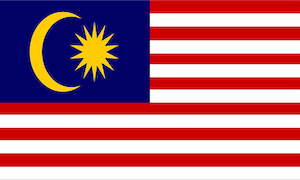
On Wednesday, former prime minister Najib Razak was charged with criminal breach of trust and using his position for personal gratification through his involvement in the 1MDB affair.
Malaysia’s former ruling party, the United Malays National Organization, chose Zahid Hamidi as its new leader in hopes of re-building its support base among the ethnic Malay Muslim majority. Zahid is unlikely to submit to the wave of liberal, multicultural politics that have taken over the Malaysian political foreground. The party suffered from a huge electoral loss after the 1MDB scandal, which is still under investigation for some $4.5 billion that went missing.
Singapore’s Defense Minister Ng Eng Hen agreed with Malaysian counterpart Mohamad Sabu to strengthen security cooperation in the Singapore Strait, which will include joint patrols. Through efforts such as these, the two countries have been reconciling their territorial disputes.
As part of the massive governmental reforms, nine Malaysian government agencies began operating as independent entities on July 1st. They now report directly to parliament.
Malaysia’s largest oil and gas company Sapura Energy Bhd. is looking to take advantage of a recent surge in global oil prices to raise up to $750 million through an initial public stock offering. On the other hand, the government has suspended its China-backed rail link project, which will only be viable with a drastic price reduction by the Chinese contractor. The project is part of China’s Belt and Road initiative and currently costs $20 billion.
Cuba – Environmental activist Ariel Ruiz Urquiola was freed this week after outcry on social media over his arrest. He had been on a hunger strike for several days before being released on parole for “medical reasons.” – New York Times
In Celebration and In Protest—Queer People’s Power in Turkey
Jul 2, 2018
Despite the government ban on the Istanbul Pride March, approximately 1000 people chose to participate in a rally on Sunday, both in celebration of their identities and in protest of the government ban. Police, dogs, and armored vehicles confronted the protesters and eleven people were detained. However, activists continued to march.